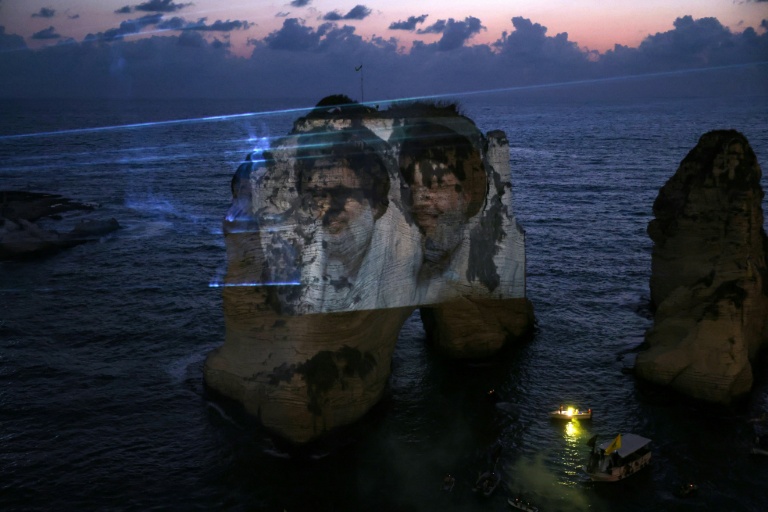Hezbollah supporters gathered Thursday in the Lebanese capital ahead of the first anniversary of Israel’s assassination of their longtime leader Hassan Nasrallah, whose portrait was projected on a Beirut landmark despite opposition from the authorities.
Carrying images of Nasrallah and flags of his Shiite Muslim movement, thousands of supporters of all ages flooded the seaside near Raouche Rock, a natural formation also known as Pigeon Rock just off Beirut’s Mediterranean coast, an AFP correspondent said.
The image of Nasrallah, who was killed in a massive Israeli strike on south Beirut on September 27 last year, and his chosen successor Hashem Safieddine who was killed days later, were briefly projected on the landmark rock at sunset.
Plans to do so had stirred controversy and division in recent days, with Prime Minister Nawaf Salam this week urging local authorities to prevent any unauthorised usage of landmarks.
A Lebanese official told AFP on condition of anonymity that Hezbollah had “obtained the authorisation” of the local authorities for the gathering “but without illuminating the rock”.
In a statement Thursday, Salam said the organisers had “clearly violated the accord” with the local authorities, adding that he had requested the perpetrators’ arrest.
Hezbollah was badly weakened in more than a year of hostilities including two months of open war with Israel that came after the Iran-backed group initiated cross-border attacks on Israel in October 2023 over the Gaza war.
Under heavy US pressure and fears of expanded Israeli strikes, the Lebanese government is seeking to disarm Hezbollah.
The group has organised a series of events to mark the anniversary of Nasrallah’s assassination.
Supporters on dozens of boats and jet skis had also converged on the area of Beirut by sea, some brandishing the group’s yellow flags, while others chanted slogans in support Hezbollah and Nasrallah.
“We’re here to renew our allegiance” to Nasrallah, said Samar Ammar, 45, a lawyer among the crowd.
“The Lebanese must be united as we have only one enemy — Israel.”
“We fought for everybody,” said Abed Samhat, 38, a delivery driver attending the event.
“The state must look at these people here… and not marginalise the resistance,” he said, referring to Hezbollah.
Israel has kept up attacks on Lebanon despite a November ceasefire and has also maintained troops in five areas of the south country’s that it deems strategic.
The death of charismatic leader Nasrallah, who led Hezbollah for more than three decades, was a heavy blow to the group, which was previously the strongest political and military force in Lebanon.
lk-lg/ami

